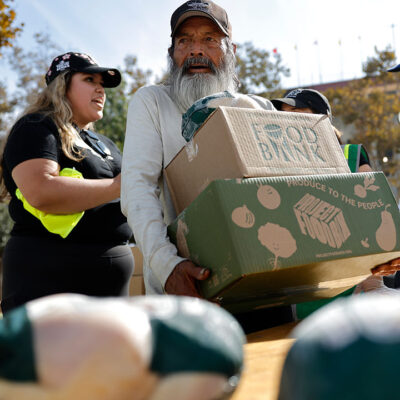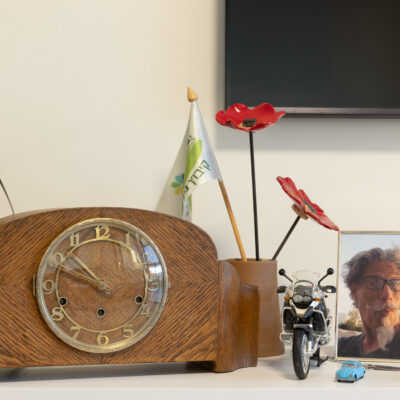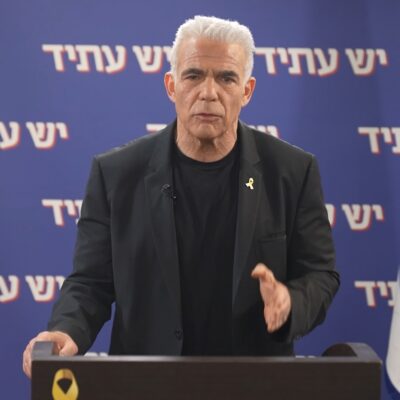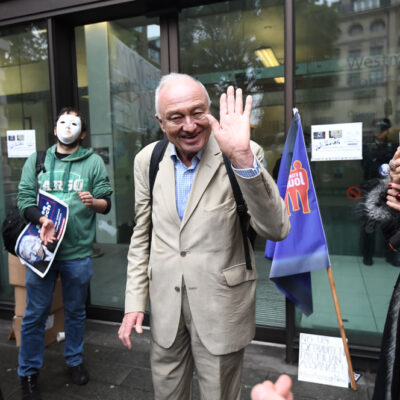Your Daily Phil: Israel ramping up medical aid to Ukrainians + Good Jewish music costs money
Good Monday morning!
An influx of medical aid from Israel to Ukraine and its borders continues to ramp up as Russia’s invasion, and the resulting outflow of refugees, has intensified in recent days. Israel announced on Saturday that medical professionals from leading Israeli hospitals and clinics would set up a field hospital near the western Ukrainian city of Lviv.
“We are putting our moral obligation into action, and delivering help to the Ukrainian people,” Israeli Health Minister Nitzan Horowitz wrote in a tweet on Saturday. Israel has also been providing humanitarian aid as its government has tried to walk a fine line between opposing the invasion and maintaining relations with Russia. On Saturday, Prime Minister Naftali Bennett flew to Moscow to meet with Russian President Vladimir Putin, and afterward spoke with Ukrainian President Volodymyr Zelensky.
The field hospital will provide urgent care and trauma treatment to injured Ukrainians as well as those who cannot leave the country, according to Dr. Dorit Nitzan, an Israeli former World Health Organization official who has been in touch with the Israeli government regarding the hospital. Nitzan is also leading an eight-person Israeli team of doctors and nurses from Natan, an Israeli disaster relief organization, that began providing care last week to refugees in the Polish border town of Medyka.
Because men of military age have been barred from leaving Ukraine, most of the patients Nitzan sees are women and children en route to other parts of Europe. She and her team, along with other professionals on-site, provide medical checkups along with basic medications those fleeing may have left at home. They have treated refugees for heart disease, anxiety and a range of infections, including infected blisters that developed on the soles of feet that after many miles of walking toward the border. The team members are volunteers, and will be replaced by another group next week, but Nitzan says Natan aims to stay on the border indefinitely.
“We wanted to make sure we found ourselves in the place where we could be of the best use,” she told eJewishPhilanthropy at approximately 1:30 a.m. local time Monday morning, right after returning from the hospital. “It’s very hard to see families with young kids carrying heavy suitcases, helping grandmothers and moms carry the babies. It’s just so sad.”
Other Jewish and Israeli groups are also sending medical help. A team of psychologists and social workers arrived on Sunday, sent by the World Zionist Organization to aid Jewish refugees. A four-member team from Hadassah Medical Organization will arrive in Lublin, Poland, on Monday to provide expertise in how to triage trauma patients. At the end of February, United Hatzalah, the Israeli emergency medical service, sent a team of medical and humanitarian aid workers to Moldova’s Ukrainian border.
BODY ART
This Jewish nonprofit uses tattoos to help survivors recover from terror attacks

Seth Wolfson/Artists 4 Israel
In late February, Pittsburgh residents gathered at the local Jewish community center for an event that may have felt unexpected in a Jewish context: a pop-up tattoo parlor meant to commemorate the 2018 Tree of Life synagogue shooting. It was organized by Artists 4 Israel CEO Craig Dershowitz, a Jewish activist who — despite the traditional Jewish prohibition on tattoos — sees body art as a way to help people process tragedy, reports eJewishPhilanthropy’s Esther D. Kustanowitz.
Strong images: During and after the event, approximately 15 survivors, families of victims, first responders and community leaders got body art related to the attack. The art ranged from the slogan “Stronger than hate,” which spread following the attack — the deadliest antisemitic attack in U.S. history — to an image of a tree to an affirmative phrase in Hebrew.
Honoring and healing: “Our goal, as always, was to help heal those who were harmed, and [we] saw tattooing as a way of getting past some of that trauma, to honor the heroes that run at the shooter instead of away from him,” Dershowitz said. “But we had a very special mission this time, which was to share the story that antisemitism and racism are the same, that antisemitism is on the rise in this country, that when left unchecked, it has deadly consequences. And that we need to stand up and fight it.”
Covering and reclaiming: Artists 4 Israel is an arts and advocacy group best known for painting graffiti murals at sites of terror attacks and for its Healing Ink program, which provides tattoos for free in order to address trauma or mark challenges that have been overcome. At the first Healing Ink event in Israel in 2016, the group tattooed participants at Jerusalem’s Israel Museum and at the site of a Tel Aviv terror attack. Ever since, Dershowitz said, Healing Ink “has been covering the scars of terror survivors and IDF soldiers injured in combat, helping them reclaim their bodies and continue to heal physically and emotionally.”
RITUALIZING MUSIC
Make them pay: Why good Jewish music costs good money

Courtesy
“Jewish music is a little too accessible these days. Think of it like hummus: once only available in specialty shops, now it can be found just about anywhere. At the beginning of the pandemic, that access was a welcome salve for the pain of isolation. By mid-2021, it was hard to get excited about another online music gathering. Is a Facebook event really an ‘event’ if you can scroll past it the same way you dismiss your college roommate’s life updates?” writes Cantor Rabbi Hillary Chorny, cantor at Temple Beth Am in Los Angeles, in an opinion piece for eJewishPhilanthropy.
Pandemic times: “As a cantor, the pandemic threw pieces of my profession and my spirit into a tailspin. I yearned for the return of live music and robust concertizing. I missed the kind of night that goes on the calendar with eager anticipation. That feeling was ignited once again last June when I called seven talented sacred music-makers from across the country and invited them to join me in a concert as part of the fourth annual Kol Tefilla Shabbaton in February 2022. It seemed a lifetime away, and for each of us it was a source of necessary optimism driving us through the throes of uncertainty.”
Investing in cantors: “When I joined the staff of a 900-plus-family synagogue about a decade ago, I followed the advice of a dear mentor: learn the budget first. The financial operations of an institution reveal much about its organizational priorities. I already knew something about Temple Beth Am that had sold me on taking the position in the first place: They sought to emplace a cantor, an invested hazzan of the Cantors Assembly, at a time when sister institutions were readily embracing ‘musical rabbis.’”
LESSONS LEARNED
Don’t just look back: Using evaluation to inform future planning

Courtesy
“In 2014, the Rose Community Foundation and the Jim Joseph Foundation partnered to create the Denver and Boulder Jewish Teen Education and Engagement Initiative, one of 10 community-based efforts across the country in the Teen Funder Collaborative (now housed at The Jewish Federations of North America). Our initiative, like others, was designed to cultivate new Jewish teen offerings, increase teen engagement and involve teens who come from diverse Jewish backgrounds,” writes Vanessa Bernier, program officer for Jewish life at the Rose Community Foundation, in an opinion piece for eJewishPhilanthroy.
Final report: “Each initiative had a critical component in parallel to these external efforts: independent evaluation. Over the course of the initiative, our evaluator, Informing Change, provided us with findings, data and analyses showing progress toward our desirable outcomes. And, if we weren’t making progress, we gained an understanding of the reasons why. The final report, based on seven years of data collection and evaluation, is a valuable knowledge-base for professionals and institutions — both locally and nationally — seeking to engage Jewish teens and their families.”
Moving forward: “Beyond looking back at the initiative’s outcomes, we plan to utilize the data from this report to inform a variety of approaches moving forward — from considering potential investments in teen engagement, elevating the needs of Jewish-teen-serving professionals, cultivating collaboration and developing a cohesive community vision around teen programming. To that end, our organization has identified key takeaways where the collected data can meaningfully inform our future investments in the Jewish community.”
Worthy Reads
Booking Empty Rooms: People are booking stays in Ukrainian Airbnbs, but not staying in them, as a gesture of solidarity and in support of Airbnb hosts who found themselves without income as tourism in Ukraine has shut down, NPR’s Laurel Wamsley reports. Last Wednesday and Thursday, more than 61,000 nights were booked in Ukraine from around the world, grossing nearly $2 million. “Speaking to NPR from Kyiv, [Airbnb host Ekaterina] Martiusheva says the bookings mean a lot: ‘These days we do not have any income. We do not have any right to ask our country to help us, because all the country’s resources are for the war and for the victory…It’s not just money, it’s the support and encouragement. We get these notes of people who are calling us brave, and it does feel great. It’s just amazing, really.’”[NPR]
Clinton Initiative Redux: The Clinton Foundation is planning another Clinton Global Initiative – a high-profile gathering of business, political and philanthropic leaders – in New York this September, Glenn Gamboa writes in the Associated Press. The former CGI, which ended in 2016 during former Secretary of State Hillary Clinton’s presidential campaign, resulted in more than 3,700 projects and partnerships affecting more than 435 million people in over 180 countries. In a letter to foundation supporters, former President Bill Clinton wrote: “It seems that all across the globe, people are pulling away from those who are different from them — putting our future at greater risk and making it harder to solve the challenges and seize the opportunities in front of us…While the challenges our world faces today are steep, CGI has always been about what we can do, not what we can’t do…And by bringing diverse partners together to take action and achieve real results, we can create a culture of possibility in a world hungry for hope.” [AP]
Joining Forces: Ukrainian President Volodymyr Zelensky and Global Citizen, an international nonprofit fighting extreme poverty, have teamed up for what they hope will be daily calls to action for the nonprofit’s millions of members, as well as its governmental, corporate and philanthropic partners, Glenn Gamboa reports in the Associated Press. “‘We hope by appending specific actions to President Zelenskyy’s daily call to action, we will be able to help citizens or corporate leaders, or in some cases, policymakers to be able to respond appropriately,’ [Global Citizen CEO Hugh Evans] said. In his video call to action, Zelenskyy asked people around the world to consider how they would react if hospitals, schools or residential areas in their cities were attacked. ‘What would you do if terrorists destroyed them completely with missiles, with air raids, with bombshells, as it is happening here in Ukraine?’” [AP]
Community Comms
Be featured: Email us to inform the eJP readership of your upcoming event, job opening, or other communication.
Word on the Street
The Open Society Foundations, with an initial $25 million pledge, launched the Ukraine Democracy Fund, which aims to raise $100 million from private foundations, philanthropists and the private sector.
The Hebrew University of Jerusalem is offering Ukrainian citizens currently pursuing a bachelor’s degree admission to HU’s Rothberg International School free of charge, including a living stipend and board, to take part in the school’s English-language courses…
Rabbi Leor Sinai has joined The Jewish Education Project’s RootOne initiative as senior director of Israel education…
The American Jewish Committee opened its first office in an Arab country, AJC Abu Dhabi: The Sidney Lerner Center for Arab-Jewish Understanding…
Masbia, the New York-based kosher soup kitchen and food pantry, has partnered with food delivery service DoorDash to provide kosher meals and groceries to families facing food insecurity in Brooklyn and Queens…
MacKenzie Scott made a $20 million gift to the Charles R. Drew University of Medicine and Science in Los Angeles $20 million. The university is one of the nation’s four historically Black medical schools…
Mercy Ships, a charity that operates hospital ships, received a commitment of $18 million from Michael and Susan Dellto help secure funding for the upcoming season of the organization’s work…
The Panera Bread Foundation announced a shift in its focus to support communities by investing in underserved and at-risk children and youth…
Ken Duberstein, President Ronald Reagan’s chief of staff during his final year in office, died at 77…
Pic of the Day

Yossi Zeliger
Ukrainian refugees arrive in Israel via Poland on Sunday. The flight, along with two others that also arrived Sunday, brought a total of 420 olim, including 100 Jewish orphans. The flights were organized by the Prime Minister’s Office and the Ministry of Aliyah and Integration.
Birthdays

JEFF KRAVITZ/FILMMAGIC
Former chairman and CEO of The Walt Disney Company, Michael Eisner…
Nationally syndicated columnist for The Washington Times since 1984, Suzanne Bregman Fields… President emeritus of the California Institute of Technology, he is the 1975 Nobel Prize laureate in medicine, David Baltimore… Former bureau chief for the AP in Kuala Lumpur, New Delhi, London and Tokyo, Myron Belkind… Geneticist and 2017 Nobel Prize laureate in medicine, Michael Rosbash… Retired media executive, she was a member of the first coed class at Yale College in 1969, Ruth Barbara Jarmul… Chairman and general trust counsel of Fiduciary Trust International, Gail Ehrlich Cohen… Award-winning freelance journalist, author and adjunct professor at the University of Maryland, Anne Farris Rosen… British public law and human rights barrister and a member of the House of Lords, he is the longtime chair of the British Legal Friends of Hebrew University, Baron David Philip Pannick… Executive director of Academic Exchange, Rabbi Nachum Braverman… Democratic political strategist, Lewis H. Cohen… Executive director of Women’s League for Conservative Judaism, Rabbi Ellen S. Wolintz-Fields…
Professor of philosophy at Johns Hopkins University and the author or editor of several books about Baruch Spinoza, Yitzhak Yohanan Melamed… Academy Award-winning actress, Rachel Weisz… Assistant news director for DC’s NBC4 News and an adjunct professor of journalism at American U, Matt Glassman… Brooklyn-based political consultant and attorney, Michael Tobman… Member of Israel’s diplomatic corps since 2010, he has been the spokesperson of the Embassy of Israel in Washington since 2018, Elad Strohmayer… Television news anchor, author and businesswoman, she is the host of “Hatched,” a business competition show on The CW Network, Nicole Lapin… Author, popular science writer, spaceflight historian, YouTuber and podcaster, best known for writing Breaking the Chains of Gravity, Amy Shira Teitel… Climate deals reporter at Axios Pro, Alan Neuhauser… Attorney in Reno, Nev., Sasha Ahuva Farahi… Marketing manager at Just Women’s Sports, Rachel Zuckerman… Digital engagement manager at AIPAC, Cory Meyer … Jake Hirth… Yaakov Spira…


 Add EJP on Google
Add EJP on Google






